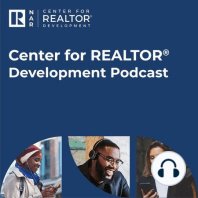65 min listen

014: Senior Market, Part 2: How Elder Care Professionals Can Help with Barbara Boone McGinnis
014: Senior Market, Part 2: How Elder Care Professionals Can Help with Barbara Boone McGinnis
ratings:
Length:
52 minutes
Released:
May 1, 2018
Format:
Podcast episode
Description
Continuing last month’s episode and conversation about the Senior Real Estate Specialist® (SRES®) Designation topics, today’s guest joins Monica to talk about the legal side of things. Barbara will discuss estate planning, probate, trusts, and what you can do as a real estate professional. This episode is full of great information and advice, and it’s important to remember that as real estate agents, we may need to recommend an Elder Care professional to our clients in order to best serve them. Topics discussed offer a great place to start and some ideas to share with our clients, but ultimately people like Barbara will be able to give our clients the best information. Barbara works at a firm that specializes in Elder Law — the primary focus is helping older people (or the families that care for older people) navigate the healthcare system, estate planning, asset protection, and post-mortem issues. Many people immediately turn to real estate when things change in their life; REALTORS® get called in when sometimes their clients may need to be referred to other professionals first. One of the things they advocate at Barbara’s firm is to be proactive as you’re approaching older age, and becoming aware of what’s in your community. Many things have changed over the last several years and many of them for the better. Barbara and Monica talk about the importance of planning a will and what estate planning looks like for people. A will is a written declaration of what your wishes are for your assets are at your death. It is good for everyone to have as well, as soon as they have something that’s worth protecting (assets, children). When it comes to estate planning, it should be thought of as a process rather than an event. As our lives change, estate plans may change in focus. Estates often include Powers of Attorney, usually one for healthcare and one for general business purposes, which is what REALTORS® would likely be looking for. There are ordinary and extraordinary Powers of Attorney, and each one allows different scopes of authority. When dealing with Powers of Attorney, it’s important to understand that every POA is not exactly the same, and understanding the authorities that are allowed. There are different competencies for POAs and can be effective immediately or effective upon some future, contingent event. As a real estate agent, you may be working with adults that don’t have full capacity. Legally, they are competent until they are adjudicated not, but they may have limited capacity depending on what type of decision is being made. This capacity may be something of concern for real estate agents. In this case, agents can go to the client's Power of Attorney or a family attorney or could go to their closing company attorney. As an agent, if you’re unsure about a client’s capacity, a respectful approach would be to ask your client if they have a Power of Attorney, to serve as a sounding board for security measures. That way the POA can protect all parties involved, but the older client can still feel like they are in control of the decision. You could also ask if there’s another professional advisor they’d like to run the decision by. Some other documents that are part of estate planning are HIPAA release, as well as a will substitute, like a trust. Trusts are legal documents that permit you to transfer assets either prior to your death or after. The grantor is the person that sets up the trust, and it’s their purpose for having the trust that guides how it’s used and what language needs to be in there. The trustee is the manager. The principle is the asset that is titled to the trust; beneficiaries are the persons who are supposed to benefit from the trust in life, as well as remainder beneficiaries that will inherit the asset after the death of the grantor. Some are very wealthy, but you really don’t have to be super wealthy to benefit from a trust. A trust is a good way to manage assets of a vulnerable person. The takeaw
Released:
May 1, 2018
Format:
Podcast episode
Titles in the series (98)
024: Creating the Customer Experience with Pete Blank: Great customer service is one of the key ways we can set ourselves apart from other people in the industry. Everybody wants (and expects) a great customer service experience. Pete Blank joins Monica on the show today to talk about his customer service... by NAR’s Center for REALTOR® Development